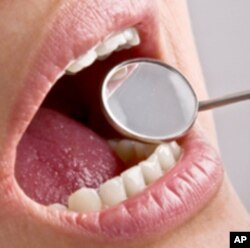A new study links dental x-rays to the most common kind of brain tumor. But the risk of these mostly non-cancerous growths is still very small, even if your dentist takes an aggressive approach to imaging.
For the study published in Cancer, about 1,400 patients - who had had the brain tumors called meningiomas - were interviewed about their family's health, their own medical history, exposure to radiation, and so on. They were compared with a control group that didn't have brain tumors.
Dr. Elizabeth Claus of Yale University, who led the study, says there was a clear relationship between dental x-rays and the brain tumors.
"We found that the individuals that were diagnosed with meningioma were essentially twice as likely to report having a specific type of x-ray, which is very common, a bitewing."
Bitewing x-rays are the ones where you clamp down - usually with your back teeth - on a holder for film or a sensor.
The link between these kinds of brain tumors and a different kind of imaging, called a panoramic x-ray, was even stronger - up to five times the risk, depending on age or how frequently the x-ray was taken.
All studies have strengths and weaknesses, and Claus says one issue was that the people in this study - typically in their 50s or older - were being asked about x-rays they might have had decades earlier.
"There is always some difficulty in people remembering past exposures. And so patients could under- or over-report their dental x-rays. So you always have to keep that in mind."
That applies to both groups, of course - the meningioma patients and the control group.
Today, dentists are more aware that, as useful as x-rays are, they can also cause harm. Maybe your dentist covers you with a lead apron when you get an x-ray. And modern x-ray equipment delivers a much lower dose than was common in years past. So Claus doesn't want to scare people away from regular dental check-ups.
"The big take-home message is, keep going to the dentist," she says. "But have a conversation with your dentist about whether you might be able to reduce the number of x-rays that you receive."




